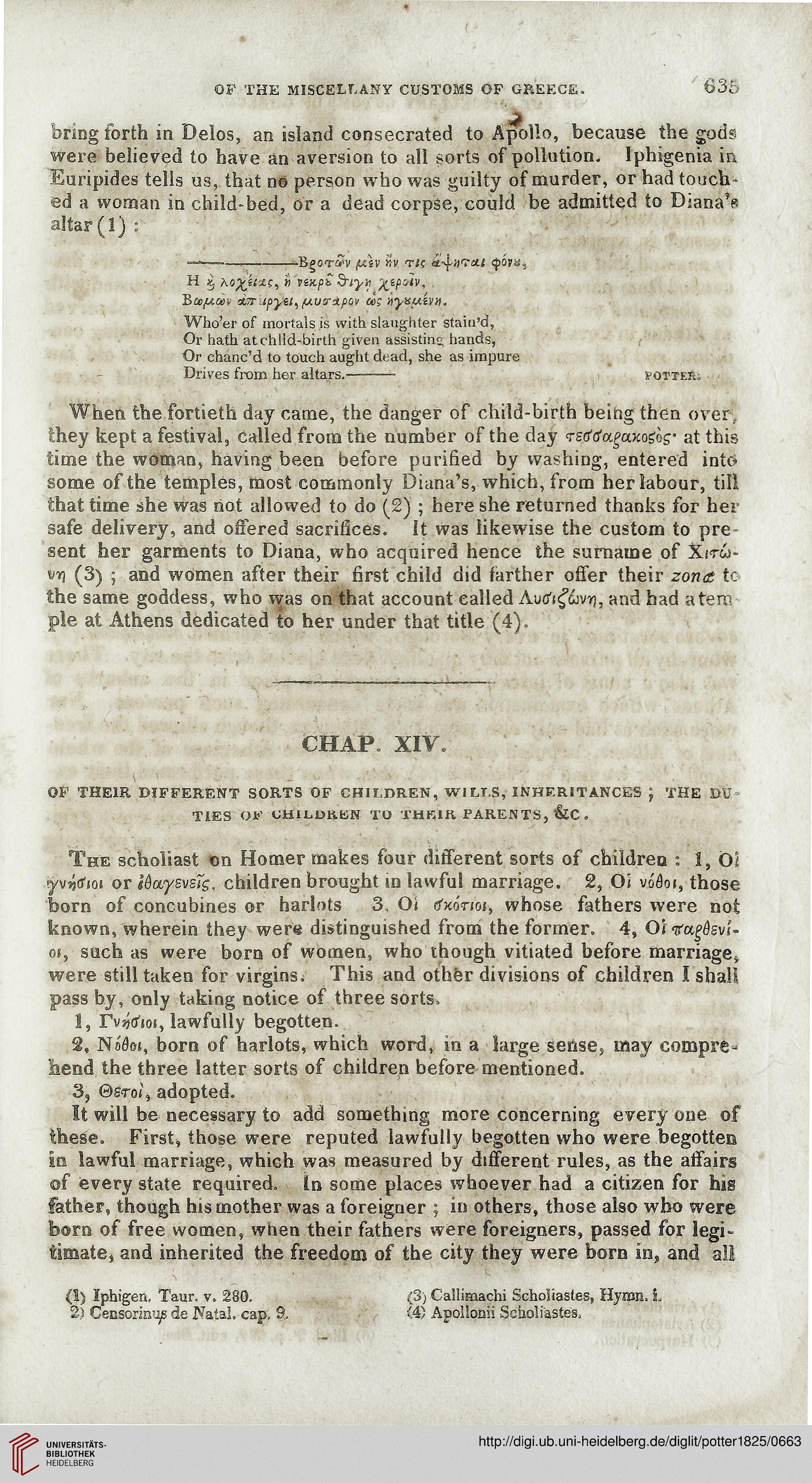*
of the miscellany customs of greece. 636
bring forth in Delos, an island consecrated to Apollo, because the gods
were believed to have an aversion to all sorts of pollution. Iphigenia in
Euripides tells us, that no person who was guilty of murder, or had touch-
ed a woman in child-bed, or a dead corpse, could be admitted to DianaV.
altar (1) :
——■—i--Bgora'v fxiv nv t/c a.-^wrt/.t <f>6rs,
Who'er of mortals is with slaughter staiu'd,
Or hath atchlid-birth given assisting hands,
Or chanc'd to touch aught dead, she as impure
Drives from her altars.-- hotter.
When the fortieth day came, the danger of child-birth being then over ,
they kept a festival, Called from the number of the day Tstftfo^axo^os- at this
time the woman, having been before purified by washing, entered into
some of the temples, most commonly Diana's, which, from her labour, till
that time she was not allowed to do (2) ; here she returned thanks for her
safe delivery, and offered sacrifices. It was likewise the custom to pre
sent her garments to Diana, who acquired hence the surname of Xitw-
vv\ (3) ; and women after their first child did farther offer their zona tc
the same goddess, who was on that account called Autfi^vrj, and had atera
pie at Athens dedicated to her under that title (4),
CHAP. XIV.
of their different sorts of children, Wl lt s, inheritances J the du
ties Of UUILDHEN TO THKIK parents, &c .
The scholiast «n Homer makes four different sorts of children : l, Oi
yvsjtfiot or iQayevsTs, children brought in lawful marriage. 2, Oi vodoi, those
born of concubines or harlots 3. Oi cfxoVioj, whose fathers were not
known, wherein they were distinguished from the former. 4, OiKugQsvi-
oi, such as were born of women, who though vitiated before marriage*
were still taken for virgins. This and other divisions of children I shall
pass by, only taking notice of three sorts,
1, rvajcfioi, lawfully begotten.
2, Na'0oj, born of harlots, which word, in a large setises may compre-
hend the three latter sorts of children before mentioned.
3, ©Stoi, adopted.
It will be necessary to add something more concerning every one of
these. First, those were reputed lawfully begotten who were begotten
in lawful marriage, which was measured by different rules, as the affairs
of every state required. In some places whoever had a citizen for his
father, though his mother was a foreigner ; in others, those also who were
born of free women, when their fathers were foreigners, passed for legi-
timate, and inherited the freedom of the city they were born in, and all
(!) Iphigen. Taur. v. 280.
2) Censoring de Natal, cap. 9.
(3) Callimachi Scholiastes, Hymn. L
(4) Apollonii Scholiastes,
of the miscellany customs of greece. 636
bring forth in Delos, an island consecrated to Apollo, because the gods
were believed to have an aversion to all sorts of pollution. Iphigenia in
Euripides tells us, that no person who was guilty of murder, or had touch-
ed a woman in child-bed, or a dead corpse, could be admitted to DianaV.
altar (1) :
——■—i--Bgora'v fxiv nv t/c a.-^wrt/.t <f>6rs,
Who'er of mortals is with slaughter staiu'd,
Or hath atchlid-birth given assisting hands,
Or chanc'd to touch aught dead, she as impure
Drives from her altars.-- hotter.
When the fortieth day came, the danger of child-birth being then over ,
they kept a festival, Called from the number of the day Tstftfo^axo^os- at this
time the woman, having been before purified by washing, entered into
some of the temples, most commonly Diana's, which, from her labour, till
that time she was not allowed to do (2) ; here she returned thanks for her
safe delivery, and offered sacrifices. It was likewise the custom to pre
sent her garments to Diana, who acquired hence the surname of Xitw-
vv\ (3) ; and women after their first child did farther offer their zona tc
the same goddess, who was on that account called Autfi^vrj, and had atera
pie at Athens dedicated to her under that title (4),
CHAP. XIV.
of their different sorts of children, Wl lt s, inheritances J the du
ties Of UUILDHEN TO THKIK parents, &c .
The scholiast «n Homer makes four different sorts of children : l, Oi
yvsjtfiot or iQayevsTs, children brought in lawful marriage. 2, Oi vodoi, those
born of concubines or harlots 3. Oi cfxoVioj, whose fathers were not
known, wherein they were distinguished from the former. 4, OiKugQsvi-
oi, such as were born of women, who though vitiated before marriage*
were still taken for virgins. This and other divisions of children I shall
pass by, only taking notice of three sorts,
1, rvajcfioi, lawfully begotten.
2, Na'0oj, born of harlots, which word, in a large setises may compre-
hend the three latter sorts of children before mentioned.
3, ©Stoi, adopted.
It will be necessary to add something more concerning every one of
these. First, those were reputed lawfully begotten who were begotten
in lawful marriage, which was measured by different rules, as the affairs
of every state required. In some places whoever had a citizen for his
father, though his mother was a foreigner ; in others, those also who were
born of free women, when their fathers were foreigners, passed for legi-
timate, and inherited the freedom of the city they were born in, and all
(!) Iphigen. Taur. v. 280.
2) Censoring de Natal, cap. 9.
(3) Callimachi Scholiastes, Hymn. L
(4) Apollonii Scholiastes,




